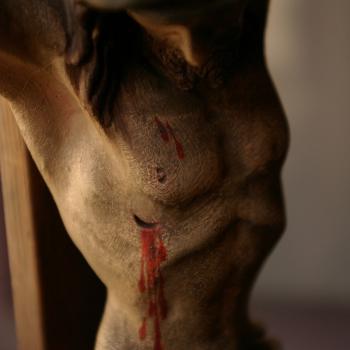On Souls, Reincarnation, and Journey of Souls, Part 3

Christianity tells the story of a journey. So does Michael Newton in books like Journey of Souls, where he presents what he learns about souls from clients under hypnosis. The Christian story is a good one. I’ll explain in Part One what I mean by that and how the Journey of Souls story doesn’t measure up.
The Christian journey is through Earth’s time and space. This is a setting with its own journey and intrinsic value. Part Two will witness to my love for planet Earth, a love that I find wanting in Newton’s story. There we see a multitude of planets where souls live, but only one journey matters. That’s the souls’ journey. Planets have instrumental value only, and only until souls no longer need them.
There is, finally, the journey of God, or, the Source as Newton’s clients’ souls name it. And that raises the question, Do we even like this Source? Would we worship It? What’s the big deal about worship, anyway? That’s for Part Three.
Part One: Stories
A good story is as serious as life.
Good stories can be happy or sad, comic or tragic. They all are dead serious about one thing – the present moment. This moment matters, it has weight, it’s a tiny part but it makes a difference to the whole. Occasionally there is a special moment, a Kairos in Greek, a critical time on which everything depends. Jesus named such a moment:
This is the time of fulfillment. The Kingdom of God is at hand. Repent and believe in the gospel. (Mark 1:15)
I imagine God, in the story that Genesis tells, discovering that a Methuselah-like lifespan is not the best thing for humans. God does us a favor by limiting our days. They
shall comprise one hundred and twenty years. (Genesis 6:3)
If our days went on for hundreds and hundreds of years, it would be hard to make a good story of them. Each year, to say nothing of each day or each moment, would count so little toward the story’s resolution. To say nothing of heirs wondering when they were ever going to get an inheritance.
God has blessedly provided us with a number of limits. In God’s story we are fragments. To ask for more than that, to expect wholeness, getting all the loose ends securely tied, is to ask for curses, not blessings.
The careless soul’s witness
The problem of way too much time on one’s hands comes across clearly in the testimony that makes up “Case 21,” on Newton’s list of clients. This person is a bit of a goof-off, as are most of the souls in his learning group. A couple more dedicated members of the group have moved on and another will probably move on soon, this soul relates. Then he asserts confidently, “We will eventually catch up to them … but not for a while.”
This careless soul states what all the testimonies assume: We’ll all get to where we need to be “eventually.” The idea of a critical moment, a Kairos, where a decision makes all the difference, has no place in this long-term faith. There will always be more moments, but there will never be a really serious one. It’s a lousy story.
Good stories have evil and good, and surprising turns.
From people who toy with the idea of multiple lives, you hear a lot of talk about karma. Karma is the unbending rule about consequences of our actions. Souls in Newton’s research are familiar with karma. Good behavior always earns its reward, even if only in another life. Similarly, you pay for every mistake. Karma doesn’t forget either the good or the bad. Not that souls are ever really bad. In the classroom of the between-lives existence of souls, everyone is very understanding. You made some mistakes; that’s all. You get another chance.
In comparison to the Christian story, this one falls really flat. The Christian story doesn’t let us forget, or smooth over with excuses and explanations, one completely obvious thing: evil is real. Christians have interesting myths about evil that don’t really explain anything but do keep the reality before our minds. And the reality is simply this: The evil in which we more or less voluntarily participate is bigger than our individual selves.
There’s another thing that Jesus won’t let us forget – forgiveness. Against all odds and against all karma, we do forgive each other, even if we have trouble saying the words. And to the same extent we have authorization to hope for God’s forgiveness. In the parable of the Prodigal Son and Prodigal Father, Jesus tells us that God isn’t interested in karma.
Forgiveness is the great surprise of the Christian story. It dissolves the laws of cause and effect, action and reaction. Something happens that wasn’t in the cards. History finds a path open where there was no path before. God says, “Behold, I am doing something new.” (Isaiah 43:19)
In Journey of Souls there is no stepping outside the laws of karma. Nobody begs forgiveness from God or anybody else, and nobody offers it. Everybody pays their debts eventually. Everybody works out their own entirely predictable salvation in their own time. Very dull!
We are thrown into our stories; thank God for that!
Existentialism gives us an image that captures the drama – the terror and the beauty – of life perfectly. We are thrown into existence; nobody chooses where he or she lands. We spend most of our lives trying to control things, but in the most fundamental ways we are not in control. This is another blessing.
In the accounts of Newton’s clients, souls get to choose the conditions of their reincarnations. Apparently, they make wise choices, usually, according to whatever they need to learn next or make up for. But there’s a surreal quality to it. It’s a nice idea, but nothing in my life prepares me to accept it could possibly be true. Very much convinces me it should not be true..
People by the millions and billions are born into poverty, famine, war, and other kinds of violence. They are born already addicted to drugs or subject to discrimination because of their color, ethnicity, or sex. Is that their choice? Or is it just plain evil? Am I supposed to think that my own “development” as a soul warrants my comfortable situation? Or that less fortunate souls are getting exactly what they need, or deserve, or chose?
Part Two: A place called Earth
Me and “my” body
There’s a lot of morality in the story that Newton and his clients tell. Way too much! Souls are forever (if that’s not too strong a word) trying to improve morally. Their lives between incarnations are learning experiences. Their classroom moves to a planet when they incarnate, and there they also show how well they have been paying attention. Souls aim to be more responsible, more loving, more good-for-something. They can stop to smell the roses on earth or to goof around in the spirit world. But that’s just a pause, a delay, in their real purpose. Eventually they’ll get back on track.
That track leads to abandoning material existence. A higher level soul already is at the point where it incarnates less often. At some point it stops incarnating. Its multiple bodies and the material world are no longer of any use to it. It has learned all it can from these merely material things. Sometime after this they unite with what souls call the Source.
Of all the things that Journey of Souls tried to teach me, this one disturbs me the most. Partly that’s because I’m fond of my own body. It can be frustrating and rebellious at times, but there’s a kind of closeness that never fades. This body is more than a possession that I happen to have. It expresses me and my relationships to others and to the world. And those relationships are the place where I begin to be a person.
The good earth
Besides my body, there’s the earth that I love. In the biblical story the material world is good—not morally good, not good for something, just good. This place is not a test or a mere tool for our advancement. Certainly not a place for us to use any we might want. It can be a valley of tears, but it’s also home. God certainly meant it that way.
Earth is God’s good creation. By contrast the so-called Source doesn’t create material things, leaving that job to higher level souls. By the way, that’s an idea that is suspiciously very close to what the ancient Greek philosopher Plotinus taught. The Source, or Plotinus’s One, is too high and mighty to be directly involved with anything as low as matter. That’s for souls to deal with until they advance beyond all that material stuff.
Part of the reason I love Christianity is that it never abandons the earth. We don’t, at least if we’re true to the Bible, imagine some far-off heaven for souls and God. We believe our bodies will be resurrected, glorified, gloriously different, but these same bodies. And Earth will be renewed—this same creation that is now “groaning in labor pains.” (Romans 8:22)
Part Three: Worship
A God who loves
I raised the question early on whether this Source and Newton’s hypnotized clients speak of is something a person would even like, much less worship. For most of Newton’s book, the Source seems to be a reality about which very little is known except that it seems to be all wrapped up in itself. It doesn’t get involved with matter at all. And it also shows no interest in the journeys that the various souls are undertaking.
The Source is on its own journey, and it needs souls to help it along, just as souls need matter to complete their journeys. I suppose it’s a good feeling to know that one is so important to the ultimate reality. But I might think that I was being used.
One of the really mysterious doctrines of Christianity is that God didn’t need to create the world. God was perfectly happy in a dynamic union of Father, Son, and Spirit and might not ever have made a world. Creation is God’s free act, and only because it was free could it be an act of love.
To worship God
Creation’s value derives from God’s love, not from what creation can do for God. Since we start out good, all of our strivings, our efforts at self-improvement, though important, are secondary. The first act of any creature is simply to be what God made it. In the natural world, that is worship. In the human world, where creation has become self-aware, that worship is thanksgiving. By this free act, serving no human purpose, we imitate the divine freedom of the creation.
It never occurs to any of the souls we hear about in Journey of Souls to worship anything. I don’t recall any of these souls, speaking through the hypnosis of their hosts, expressing thankfulness for anything. Perhaps that’s just an oversight, and maybe Newton, the hypnotist, didn’t ever ask, “What are you thankful for.” But maybe, as I suppose, thankfulness doesn’t fit well with a regimen of self-improvement.
Conclusion
I believe that all cases of memories of past lives and past experiences between lives have natural, and not paranormal, explanations. I do not have familiarity with this sort of paranormal research to justify this belief. What I have tried to do instead is indicate some reasons why reincarnation is contrary to Christian belief and common human experience.
It doesn’t fit with the Christian belief in the resurrection of the body or the importance of the one unique, particular, unrepeatable life of Jesus of Nazareth in the flesh. If reincarnation were correct and compatible with Christianity, depicting the crucified body of Jesus in images and on crosses wouldn’t make any sense. We should be receiving “the soul of Christ,” but not “the body of Christ” in Communion. The Body of Christ wouldn’t be an appropriate image for the Church. Abortion wouldn’t be nearly so bad, and neither would starving children and rape.
But with these last examples I’m getting into common, not specifically Christian, experience. We are just naturally concerned and angry about unjust suffering of human beings (and animals) because bodies are more than just shells or instruments for souls. We care for the earth because the material world is more than a temporary stage for souls on their way to a higher plane. And we know in some way, even though it’s contrary to the American religion of optimism and progress, that we are simultaneously sinners and loved as we are.
For some of us that last knowledge leads to some convictions about salvation, namely, that it comes as a free gift, that we haven’t earned it, and so we fall on our knees in grateful worship and rise to pass on the love that has filled us.
Image credit: University of Canterbury via Google Images












